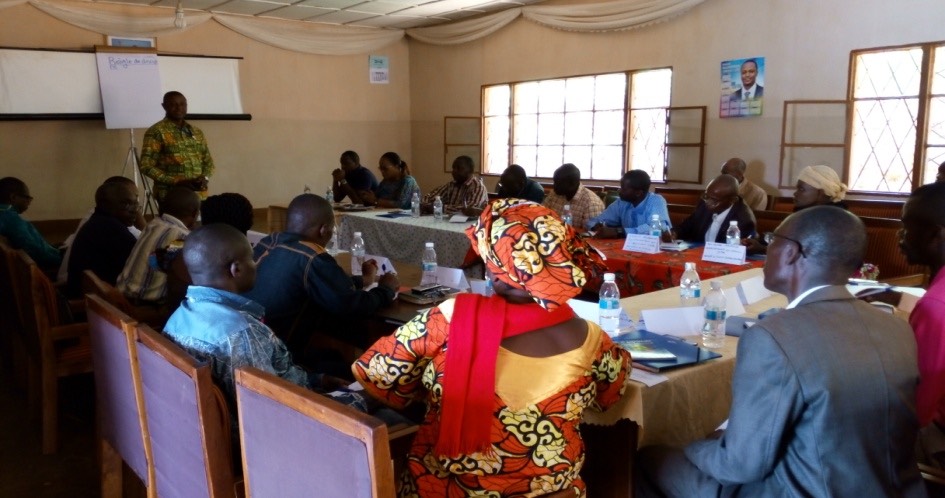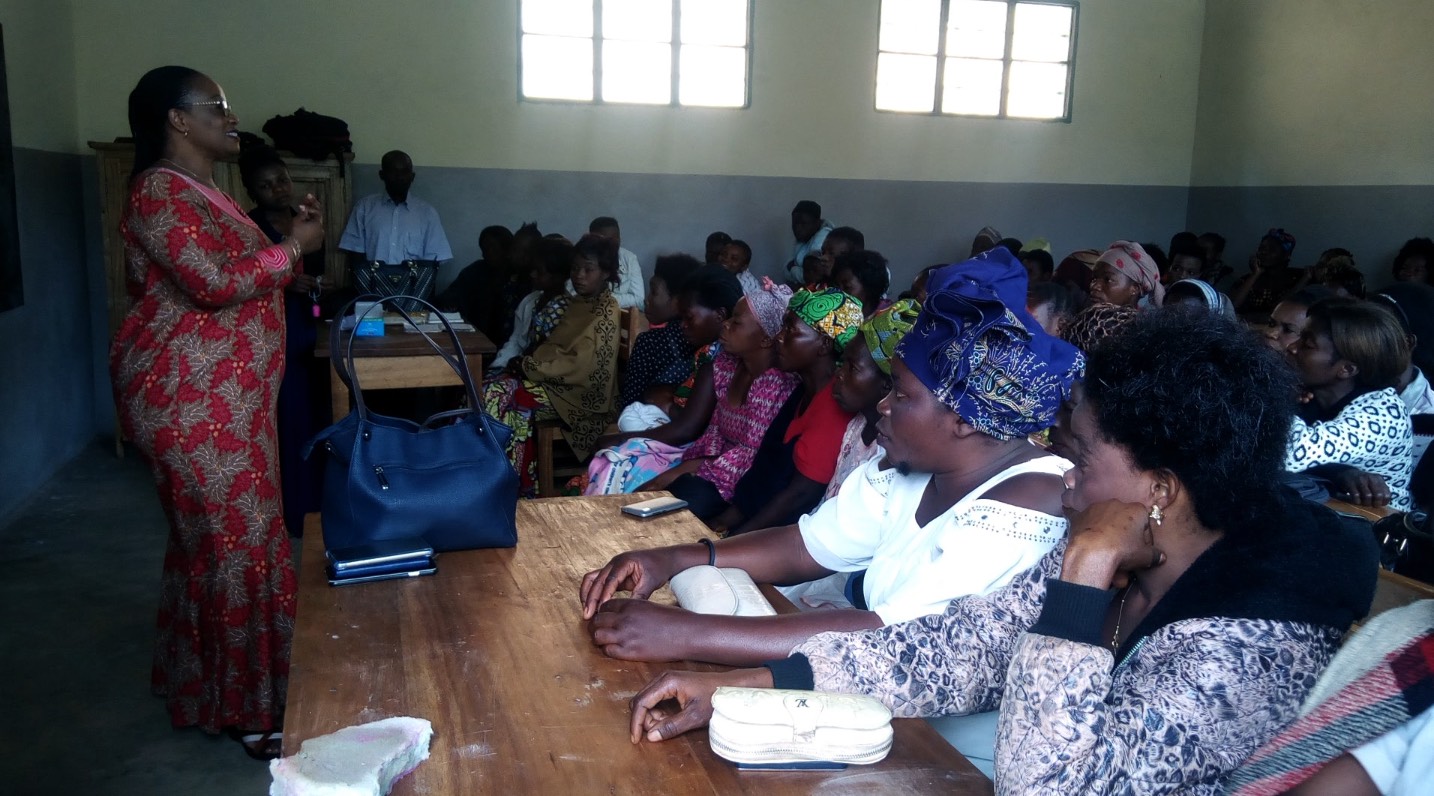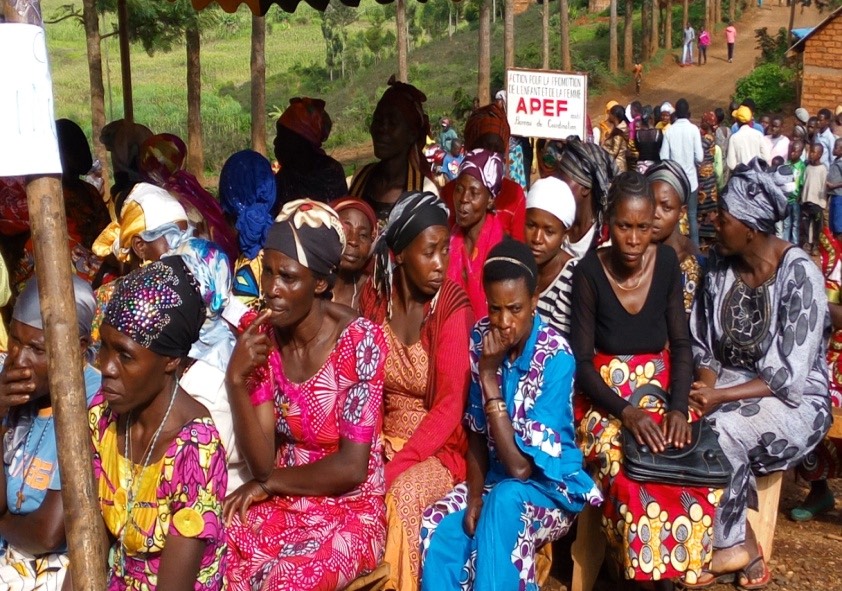Democratic Republic of the Congo
Chiefdom of Luhwindja
2016 - 2019
Urban / Local Planning
All the territory
To achieve greater levels of equality in terms of participation and to integrate diversity as a criterion for inclusion.
This objective was achieved at the time when the experience was designed, insofar as it was the delegates of the association forums that initiated the experience, through the intermediate evaluation for the start-up of the Local Development Plan and that subsequently, throughout the duration of the project, and even afterwards, by ,means of social insertion and values, such as “greater equality in participation and diversity for an effective inclusion” have remained as a source of inspiration for the project interventions.
Thus, by placing professional female sex workers at the centre of the project and actually listening to what they have to say, it was possible to draw up a participative and inclusive planning and, in this way, preserve the above-mentioned thematic spheres.
During the holding of the forum for the delegates of the associations it has been possible to listen to the voices of each and every one of the participants and, definitively, conceive the experience.
During the awareness campaigns the professional female sex workers expressed themselves freely, setting out the exploitation that they and their children, both boys and girls, are victims of at the mining operations.
During the implementation of the project all of the activities have been directed towards the unique perspective of embodying the values of equality and inclusion, with regard to both the minors attending the remedial educational centre and the young people attending the work training centre.
The most innovative element of the experience consisted of the spectacular changes that took place in the community following the start-up of the experience.
As a result these people, who had previously been sex workers have been able to leave this degrading work behind them and have decisively integrated themselves into the community as local development actors, and the producers of goods and services, which in turn has led to the empowerment of the community as a whole, making it more peaceful and increasing the level of social cohesion.

The procedure is transferable to the extent that there are vulnerable or marginal people, people who have been rejected, in every community, every territory, city or municipality.
Moreover, it is evident that the actions taken by our local governments often do not contemplate providing public services, such as education, health care, clean water, hygiene, sewers or environmental protection for those that may be considered “the dregs” of society. On this basis there could be a spreading of awareness, a renewed interest in the reproduction of this experience at a worldwide level.
The experience is feasible insofar as it concerns the marginalised classes and, to a certain extent, offers them a long term solution. As this has been a pilot project our intention is to repeat it, given that the number of beneficiaries, both direct and indirect, has been important, based on the results obtained on the ground.
Moreover, the fact that it has been possible to incorporate these people, who were previously marginalised by society, has led to a growing enthusiasm and interest, which in turn has turned into a veritable school of participatory democracy. Sex workers are vulnerable people and if we do not listen to them their misfortunes increase and they become a source of insecurity and poverty, above all in terms of the spread of sexually transmitted diseases. For this reason calling on the local NGO, specialising in women and childhood, has been the right choice, insofar as it is a successful instrument for the achievement of a pertinent and efficient social transformation.
As mentioned above, this experience was conceived by local government, through the forum for the delegates of the associations. The implementation of the experience was then entrusted to a local NGO and was based on an association protocol.
With regard to the thematic spheres of the project, a number of different actors have taken part in the process.
The Minister of Education, given that the children, both boys and girls, that depend on these professional female sex workers have been able to receive some elementary education (at 3 years old instead of 6), as per the regulations and programs imposed by the national authorities.
The Ministries of Foreign Affairs, Vocational Reintegration and Employment, given that these women, having received some kind of training, not only have to receive training certificates, they also have to be assisted by social reintegration teams so that they can seek work and produce goods and services.
At the start, in the middle and at the end of the project, the local civil society and local leaders took part in starting up the experience through exchange meetings. From that point on, they were invited to become consumers of the goods and services provided by these women and young people, promoted by the training and work centres of the NGO A.P.E.F.
Each of the actors has played their part:
Local government, i.e. the Chiefdom, sponsored the project from start to finish: awareness, safety, the organisation of the meetings at the civil society level, monitoring and evaluation, along with the local NGO.
The Ministry of Education has officially acknowledged the Remedial Education Centre that was opened for the minors, boys and girls, who as a result have the right to participate in the final primary school examinations. Some of these children have subsequently gone on to secondary education. The National Education Inspectors have paid regular visits to the Remedial Education Centre, set up by the NGO A.P.E.F., which has obtained good qualifications.
The Ministries of Social Affairs, Gender, Social Reintegration, Work Training and Employment, each one within its purview, have all ratified the training, provided by the NGO A.P.E.F., for the female sex workers and the marginalised young people from the mining operations.
Local civil society, the political and administrative authorities at provincial level that depend on the Chiefdom, have accompanied and promoted and accompanied the activities of the project.

In the sphere of our experience the evaluations were guaranteed by a national level NGO, the “Panzi Foundation“, which had carried out an evaluation prior to the start-up of the project (Prior Evaluation), consisting of a verification of the suitability of the objectives, considering the needs, challenges and problems to be resolved.
During the project itself, the Chiefdom and this NGO carried out another evaluation that allowed for the consolidation of the action taken, verified that the needs continued to exist and that the project management was being carried out in the way that had been anticipated (Intermediate Evaluation)
The main achievements were: 7 sewing workshops, 3 restaurants, 1 soap factory, 6 mechanical workshops, 3 basket-making groups, 2 individual herder/farmers, 3 safety cooperatives, all of which are up and running, and represent the most eloquent proof of our success.
Moreover, as we are now approaching the end of the project, the evaluators from the EU will be coming over in July to draw up the Final Project Evaluation.
With regard to accountability, accounting has been carried out on a regular basis through the application of the QUICKBOOKS software, which has allowed us to draw up accounting documents of use for the management of the organisations, the daily book for the operations, the balance sheet, as well as bank books and cash books.
A financial report was issued for each quarter as a back up to the annual financial statements.
The auditing of accounting and administrative operations has been ratified by the national NGO, the “Panzi Foundation”.
How has the information been shared with the public?
In order to share the information with the community, the A.P.E.F. and the Chiefdom organised awareness and information sessions, accompanied by local leaders (religious leaders, educators, safety services, the people running mining areas…) as part of the information sharing and project activities evaluation sphere. A process of awareness has been carried out, for both the people in the towns and the mines, along with the churches and, in particular via Community Radio, through which the NGO A.P.E.F. broadcast a weekly program.
How has the return to the citizenry been carried out following the finalisation of the procedure?
Every year the A.P.E.F. have issued an Annual Report regarding the activities, presented to public bodies, such as the Chiefdom, the Social Affairs Department, the Planning Ministry and others.
The A.P.E.F., along with all of the small organisations created thereby, are up to date with all of their fiscal and social obligations with regard to the Congolese State, both at the level of the Province and the Chiefdom.
Who has evaluated the quality of the procedure and the results (e.g. how many people have taken part, what were their profiles, how have they perceived the process)?
As mentioned above, the evaluation is to be assured through the evaluators from the Chiefdom, the “Panzi Foundation” and, in the end, those of the EU, given that the project is still underway. The conclusions to their report constitute their evaluation in relation to the management of activities.


